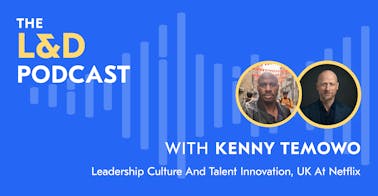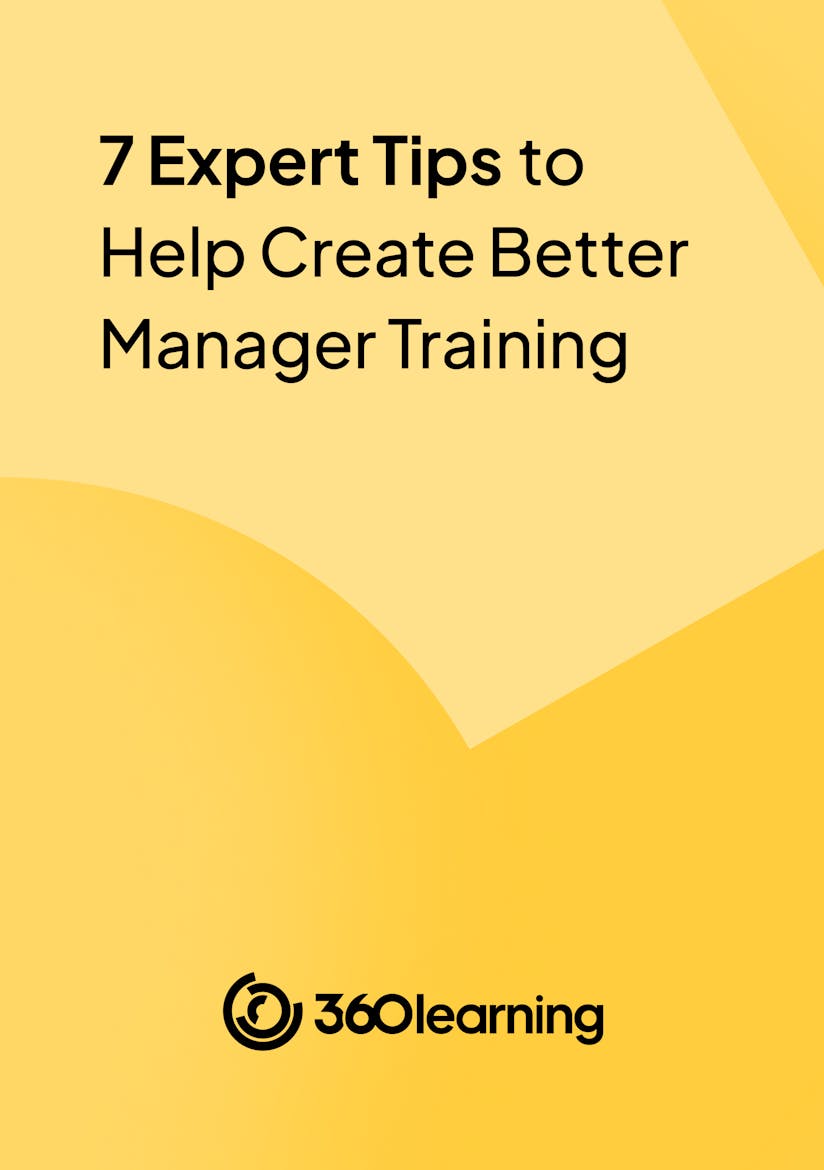

Training & Learning
Three Essential Stats for L&D Professionals With Nick Shackleton-Jones and Kenny Temowo
Many L&D professionals have burning questions about the future of our function.
For example, should we keep leadership development as is or rethink our programs through a different lens, such as manager accountability?
Today, we answer this question along with others with insights from Nick Shackleton-Jones and Kenny Temowo. In this article, we explore how L&D can rethink leadership development, three significant statistics that will impact the future of our function, and how performance support can redefine our learning interventions.

Great managers aren't born, they're made.
By providing your contact info, you agree to receive communications from 360Learning. You can opt-out at any time. For details, refer to our Privacy Policy.
Rethinking leadership development
Leadership development is crucial, but L&D needs to rethink how it designs and deploys its interventions to help leaders grow.
“I think leaders often don’t realize the significant role they play in people’s lives,” says Nick.
“I think leaders often don’t realize the significant role they play in people’s lives," - Nick Shackleton-Jones.
Recent research by the Workforce Institute at UKG found that 69% of employees said managers have just as much of an impact on their mental health as their partner at home. L&D should correct that by developing leadership to ensure people have a better work experience.
As Kenny suggests, one approach is to focus on manager accountability. While gaining knowledge and skills is essential, the organizational culture must support your interventions' goals to maintain your leadership development.
“The way I would change leadership development is to make leaders of leaders accountable for decision-making,” says Kenny.
Read on to discover the three statistics that will impact leadership development and the broader L&D function in the future.
70% of all change initiatives fail
For varying reasons, including employee resistance and lack of leadership role modeling, 70% of change programs fail.
“Whether it is 70%, 99%, or 5%, we’ve all been in situations where the leadership team has completely jacked up a change initiative, and L&D has been brought in to pick up the pieces,” says Kenny.
“Whether it is 70%, 99%, or 5%, we’ve all been in situations where the leadership team has completely jacked up a change initiative, and L&D has been brought in to pick up the pieces,” - Kenny Temowo.
For a change initiative to really make an impact and achieve the desired state, we need to ensure that people feel they are brought along with the change and provide them with the right context.
Marcus Buckingham and Ashley Goodall's new book, Nine Lies About Work, focuses on how we can help our organizations manage stability, a sense of belonging, and the psychological safety we need rather than directly and solely managing change.
Gen Z’s average tenure is two years
A recent study found that the boomer generation’s average tenure in an organization is about eight years, while Gen Z's hovers around two years and is likely to decrease.
“The statistics mean that future generations will have a completely different perspective on work, which will radically alter our thinking when it comes to L&D,” says Nick.
“The statistics mean that future generations will have a completely different perspective on work, which will radically alter our thinking when it comes to L&D,” - Nick.
The future challenges for L&D these statistics highlight include:
- Efficiency: Organizations can’t afford to spend several months training people who may only stay for two years.
- Competence: L&D will need to ensure that new employees become competent and are integrated into the company's workflow quickly.
- Knowledge: We need to focus on capturing, sharing, and deploying the valuable and tactical knowledge of experienced employees.
80% of employees prefer online learning
Our 2024 State of Online Learning Report reveals that four out of five employees prefer online learning for their development and believe it’s effective for upskilling.
Personally, it surprised me that L&D no longer has to think we need to drag resistant stakeholders to online learning. Today, online learning is expected and respected. But if it’s so well received, the elephant in the room is that skills gaps continue to grow (I take a stab at joining the dots in the report).
Whatever L&D thinks will work to improve performance and close skills gaps, we need to balance the learning approaches that we leverage to effectively and efficiently impact the work and help people. We should aim to assist people in achieving their current needs and future desires to ensure they feel invested in and belong in our organization.
Redefine learning with performance support
In L&D, the common misconception that any learning is good continues to prevail.
What actually works to achieve our desired outcomes is not bums on seats, clicks, or time spent learning but understanding the problem as effectively as possible.
For example, The Checklist Manifesto by surgeon Atul Gawande found that replacing a two-week training course with a single checklist significantly impacted desired outcomes, such as mortality rate.
“Learning is not always the answer to performance. Removing the need to learn, as Gawande did with performance support, was a much better way to achieve the desired outcome,” says Nick.
“Learning is not always the answer to performance. Removing the need to learn was a much better way to achieve the desired outcome,” - Nick.
Explore the live conversation further by checking out the episode of The L&D Podcast: Live with Nick Shackleton-Jones and Kenny Temowo
Want more peer insights on transforming workplace learning? Sign up to become a member of the L&D Collective. Or you can subscribe below to our weekly newsletter to receive our latest posts directly in your inbox.



